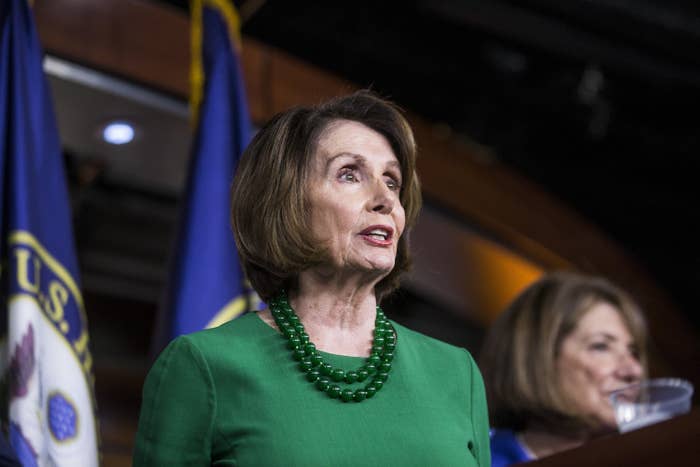
WASHINGTON — The House of Representatives will vote on a resolution formalizing its impeachment inquiry into President Donald Trump this week, following attacks from Republicans and the White House and just days after a judge ruled there was no legal requirement to do so.
“For weeks, the President, his Counsel in the White House, and his allies in Congress have made the baseless claim that the House of Representatives impeachment inquiry ‘lacks the necessary authorization for a valid impeachment proceeding,’” House Speaker Nancy Pelosi wrote in a letter to her caucus Monday. “They argue that, because the House has not taken a vote, they may simply pretend the impeachment inquiry does not exist.”
Pelosi goes on to say that the Republican argument “has no merit” but that the House will vote on a resolution Thursday affirming the inquiry, “including all requests for documents, subpoenas for records and testimony, and any other investigative steps previously taken or to be taken as part of this investigation.”
The speaker’s announcement comes just three days after a judge ruled the House was legally engaged in an impeachment inquiry and no floor vote was required to officially open an investigation. The judge also ruled that the House Judiciary Committee should be allowed to view secret grand jury evidence that was part of former special counsel Robert Mueller’s investigation into foreign interference into the 2016 election.
"Even in cases of presidential impeachment, a House resolution has never, in fact, been required to begin an impeachment inquiry,” District Judge Beryl Howell wrote last week.
The White House had previously sent a letter to Congress saying it would not cooperate with the impeachment inquiry, in part because the full House had not voted to authorize the probe. The Trump administration has blocked several officials from testifying already.
Last week, a group of Republican members of Congress stormed a secure area to protest private dispositions held by the three committees investigating Trump as part of the inquiry. It was the latest escalation in a series of complaints from Trump’s allies in Congress, who have railed against how Democrats have so far managed impeachment. Republicans have focused their attacks largely on the impeachment process and avoided questions about Trump's actions, focusing on confusing and, frankly, boring aspects of impeachment to protect the president.
White House spokesperson Stephanie Grisham said that the administration would need to see the text of the House resolution before fully commenting, but added: "Speaker Pelosi is finally admitting what the rest of America already knew – that Democrats were conducting an unauthorized impeachment proceeding, refusing to give the President due process, and their secret, shady, closed door depositions are completely and irreversibly illegitimate."
In response to Pelosi's announcement, House Minority Leader Kevin McCarthy tweeted, "Today’s backtracking is an admission that this process has been botched from the start.
"We will not legitimize the Schiff/Pelosi sham impeachment."
The resolution the House will vote on this week will establish the procedure for public hearings — something Democrats have said are coming soon — and authorize the disclosure of transcripts of depositions with key players in the impeachment inquiry, Pelosi said in her letter Monday.
“We are taking this step to eliminate any doubt as to whether the Trump Administration may withhold documents, prevent witness testimony, disregard duly authorized subpoenas, or continue obstructing the House of Representatives,” Pelosi wrote. “Nobody is above the law.”
The House has been engaged in its impeachment inquiry for over a month, holding depositions almost daily. Democrats who have been present for the depositions have said they’ve been extremely valuable, while Republicans have largely been critical of the process.
Perhaps most notable so far has been the testimony of Bill Taylor, the top US diplomat to Ukraine, who shared details with members of Congress last week about Trump’s efforts to secure Ukraine’s help investigating former vice president Joe Biden and the 2016 election in exchange for US aid, getting to the heart of the apparent quid pro quo at the center of the inquiry.
“It’s just the most thorough accounting we’ve had of the timeline,” Rep. Tom Malinowski, a Democrat who sits on the Foreign Affairs Committee, said of Taylor’s testimony last week. “It fills in details that some other witness somehow forgot about … He just went over basically everything he experienced.”

